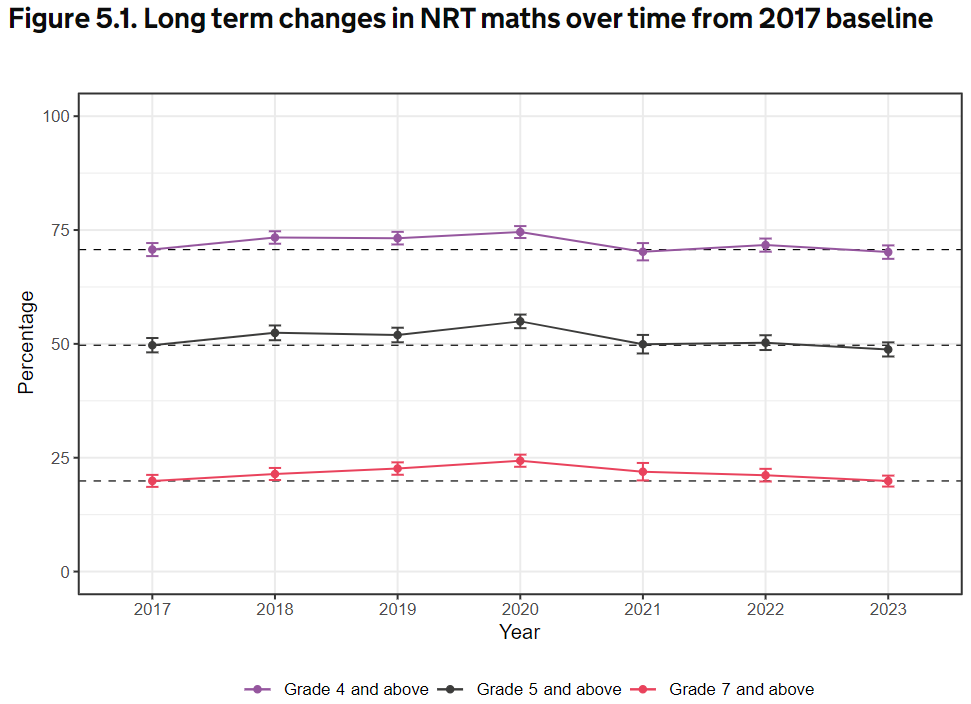Reflections on the 2023 maths examination results
An article from our Director, Charlie Stripp
11/09/2023

Exam success is a side-effect of education, not its purpose, yet exams often seem to dominate students’, parents’ and teachers’ thinking about education. As the recent Ofsted mathematics subject report highlights, too much focus on preparation for exams – ‘teaching to the test’ – and taking decisions about entry tiers too early has a negative impact on students’ mathematical learning. The report also makes the point that ‘Strong exam outcomes do not, necessarily, indicate a high-quality maths education because, in some schools, pupils are taught a narrowed curriculum that allows them to be successful in exams without securing the mathematical knowledge they need to be successful later.’
In my blog post on maths to 18, I explained the importance of learning maths and how we are making progress in improving attitudes towards maths, enabling more young people to appreciate its value and enjoy learning it.
Despite my reservations about an over-emphasis on exams, I view the annual cycle of exam results as a useful indication of how education is progressing. This is especially important following the severe disruption to our education system caused by the Covid pandemic. So, what happened with this year’s maths results?
- In KS2 SATs, which are assessed against a constant national standard, 73% achieved national expectations in maths. This was an encouraging improvement on last year’s 71%, but still well below the pre-pandemic level of 79%.
- For this year’s GCSE and A level exams, Ofqual decided that:
‘This year GCSEs, AS and A levels are returning to pre-pandemic standards, with protection built into the grading process to recognise the disruption that students have faced.’
It is sensible that grading should return to pre-pandemic standards, so that results can be compared meaningfully over time. Inevitably, this means that this year’s GCSE Maths, Core Maths and grades in A level Maths/Further Maths were lower than the previous three years. During the pandemic, grades had to be awarded differently due to the severe disruption to our education system and were, understandably, somewhat generous.
So, how do this year’s A level and GCSE Maths results compare with those pre-pandemic? In my analysis below, I’ve compared this year’s results with 2019, the last year we had a ‘normal’ exam cycle.
MEI publishes analyses of the examination results for AS/A level Mathematics and Further Mathematics (based on Joint Council for Qualifications (JCQ) data) and Core Maths (based on exam board data) each year.
The headlines for 2023 are:
- A level Maths and Further Maths participation is almost unchanged from 2022, with around 96,000 taking A level Maths and 15,000 taking A level Further Maths.
- The proportion achieving grades A*–A in A level Maths in 2023 was 41.9%, 0.9 percentage points higher than 2019. The corresponding figure for Further Maths was 58.5%, five percentage points higher than 2019.
- Female students continue to be under-represented in the maths A levels, with proportions remaining at just under 40% for A level Maths and just under 30% for A level Further Maths.
- Core Maths participation has risen slightly to well over 12,000.
- The proportion achieving grade A, 18.2%, was 1.6 percentage points higher than in 2019.
Before considering this year’s GCSE Maths grades, it’s useful to look at the outcomes from the National Reference Test (NRT) over the last seven years. The chart below is taken from Ofqual’s National Reference Test Results Digest 2023.
This chart shows there is no statistically significant difference in the maths NRT performance between 2017 and 2023 (the increase between 2017 and 2020 was reversed from 2020-2023). It’s reasonable to surmise that this decline has been caused by the impact of Covid.
For students taking GCSE Maths at the end of Year 11 in 2023, the proportion achieving grade 4 or above was 71.7%, 0.9 percentage points higher than in 2019. For students re-sitting GCSE Maths, the corresponding proportion was 16.4%, 4.8 percentage points lower than in 2019. The lower grades for GCSE Maths resit students compared to pre-pandemic are to be expected, given that they were in the secondary school cohorts likely to have been most severely affected by Covid.
How do we build from here?
In short, we carry on our strategy of supporting teachers of maths to ensure all children can gain the knowledge and skills needed to understand and use maths and appreciate its value.
England’s schools are making good progress in improving maths teaching. This is reflected in the main findings of the latest Ofsted mathematics subject report, though there is still much more to do.
Extensive, high quality professional development is available free of charge through the NCETM and Maths Hubs, the AMSP and MEI. Suitable programmes are available for all teachers of maths, including an excellent programme to enable teachers of other subjects to develop their skills to teach maths, so helping to address the shortage of secondary maths specialists. Programmes to support FE teachers of GCSE Maths resit and Functional Skills Maths from the NCETM and MEI.
These programmes can help us work together to improve maths education for all young people, so helping them to regain and surpass pre-pandemic achievement levels.
